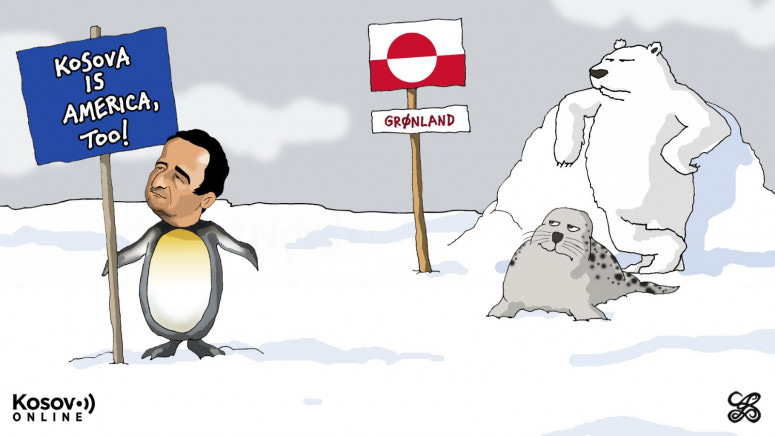What Do Greenland and Macedonia Have in Common?
NATO, 20 Jan 2025
Biljana Vankovska – TRANSCEND Media Service
15 Jan 2025 – At first glance, the answer to what a distant, massive island and a small landlocked country have in common seems simple: absolutely nothing! Except that both territories are part of the NATO family—Greenland through Denmark, and Macedonia, after selling its name, identity, and culture to gain NATO membership.

Even before entering the White House, the newly elected U.S. president started making remarks that, for some, are amusing, while for others, serious. In Macedonia, silence prevails. There isn’t even any humor about it. In contrast, neighboring Serbia is trolling 24/7. But such is the submissive, servile spirit of this small country, which, as a reward for its sacrifices, secured a position for Radmila Šekerinska as NATO’s Deputy Secretary General. This alone should be enough to spark jokes, but instead, her position alongside Rutte brought the government and opposition closer together, as both see it as a source of pride and recognition for a small state like Macedonia.

So, what exactly are the Serbs finding so amusing? Well, we all know they’re a people with a great sense of humor—often at their own expense, but also at the expense of those who try to make fools of them while they’re in their right mind.
Donald Trump’s announcement that he would “by hook or by crook” annex Greenland—essentially “liberating” it from Danish rule—immediately drew parallels to how the United States created the state of Kosovo. This process involved violating the UN Charter, bombing the then-Federal Republic of Yugoslavia (composed of Serbia and Montenegro) in 1999 under the pretext of defending human rights, and later drafting a constitution and recognizing a new state.
In short, the Serbs are already anticipating what might happen, having learned from their own experience. A part of the territory of a sovereign state was severed and placed under American protection (complete, of course, with the largest military base in the Balkans, Camp Bondsteel) until it ultimately declared independence.

For the United States, nations—or parts of them, including minorities and groups—are about as significant as last year’s snow, unless they serve some geopolitical interest. Kosovo became the second Albanian state, and a third is gradually being created on the territory of Macedonia—slowly, but under careful control.
Macedonians should find little humor in Trump’s plans to “Make America Great Again” in a territorial sense—expressing ambitions toward Greenland, Canada, and Mexico. A leftist commentator recently framed Trump’s ambitions within Lenin’s definition of imperialism as the highest stage of capitalism. According to this perspective, perhaps the ultimate stage of imperialism is embodied by the comical figure of Donald Trump as the leader of the American Empire.
Indeed, many are unsure whether Trump’s remarks are just another unserious, absurd outburst from a man whose thought process is difficult to discern (if he thinks before speaking at all) or a dramatic signal of a “new world order.”
Great powers possess the privilege of inconsistency and the ability to ignore rules that apply to everyone else. For instance, Article 2, Paragraph 4 of the UN Charter clearly states: “All states shall refrain in their international relations from the threat or use of force against the territorial integrity or political independence of any state.”
Many have likely forgotten that during his first term, Trump, speaking from the UN headquarters, threatened to completely destroy North Korea—though he later played the role of peacemaker when meeting with the North Korean leader. The point is, in a world governed by international law, even a threat of force or an attack on the territorial integrity of a state is prohibited. In a normal world, such a declaration from a military superpower would trigger widespread alarm. Yet here, even Denmark’s Prime Minister treads carefully, choosing her words to avoid offending the new emperor.
Incidentally, Denmark has long been a NATO hawk, the most loyal defender of American interests, or, to put it bluntly, a lapdog rivaled only by Tony Blair’s Britain. Completing the parody is the fact that one NATO member threatens another, instead of pledging to defend it if needed. The NATO Secretary General dismisses the issue, leaving the “hot potato” in Denmark’s court rather than mediating between two members now embroiled in what seems to be an emerging territorial dispute.
Trump’s statement about Greenland can be analyzed through multiple lenses, but the most significant are geopolitical and geo-economic. The potential annexation of Greenland by the United States (which already has significant military installations on the island and has long coveted the territory) is emblematic of Trump’s neo-imperialism. If the U.S. decides to pursue this, they will likely get what they want: Denmark neither has the resources nor the means to defend the island, unlike Margaret Thatcher, who defended the Falkland Islands—albeit for different, domestic reasons.
NATO, in this case, would not invoke Article 5, even if Copenhagen desperately called for it, because within NATO, everyone knows who’s in charge. NATO equals the U.S., and vice versa. However, when Trump’s stance on Greenland is considered alongside the sudden acknowledgment of Russia’s legitimate concerns about NATO’s eastern expansion into Ukraine, it signals something far more serious. The formula of “quid pro quo”—I give you something, you give me something—is the transactional approach Trump might use with geopolitical rivals.
Moscow used the Kosovo precedent to justify its annexation of Crimea, and now the war with Ukraine. Similarly, Trump could justify the annexation of Greenland by pointing to Russia’s invasion, provoked by what it perceives as an existential threat to its survival.
In just a few years, the world has transitioned from a global order ostensibly based on international law (however imperfectly observed) to one based on arbitrary rules. Now, it seems we are only one step away from a world ruled by an order with no rules at all—where the law of the jungle prevails, where might makes right.
To return to Macedonia: why is this paradigm shift significant? Because it demonstrates that NATO provides no real guarantee of survival or security, even for its member states. Previously, this argument could be illustrated with the ongoing latent conflict between Turkey and Greece (still unresolved), but now we can easily envision another hypothetical scenario.
If Trump demonstrates an understanding for Russia’s concerns and leverages this to advance American interests—interests that stretch across the globe, marked by the presence of 800 military bases—the possibility of redefining borders becomes a tangible reality. At present, Bulgaria’s aspirations toward Macedonia are masked under the guise of protecting the rights of Bulgarian minorities in the country, presented as a demand for constitutional amendments under the looming threat of vetoing Macedonia’s EU accession negotiations. Historically, Bulgaria has repeatedly aligned itself with losing sides (during the Balkan Wars and the two World Wars), and aligning with Trump appears to echo this familiar trajectory.
But what happens if, in a world with no rules, Sofia decides in a few years to send tanks into Macedonia? In a NATO where everyone is a wolf to one another, do you think anyone would stop them? We all remember Trump’s remark during his first term that he had no intention of starting World War III to defend a microstate like Montenegro. Of course, NATO’s purpose is not defending its members—it exists to serve American global interests. In terms of population, Montenegro is a ‘giant’ compared to Greenland but a dwarf in terms of strategic importance.
Macedonia’s survival in such a neighborhood depends solely on Washington’s will (even Macedonians themselves seem unwilling to fight for it, having capitulated after being lobotomized by NATO propaganda). Under Trump, Washington has big plans and little interest in caring for a small, insignificant country in the Balkans.
In the end, perhaps Radmila Šekerinska will have the ‘honor’ of announcing the grim reality: that Macedonia is to Bulgaria what Ukraine is to Russia and Greenland is to the U.S. And we will be expected to feel grateful that we are not Palestinians, even though we’ve already suffered nothing less than cultural genocide.
_____________________________________________
 Biljana Vankovska – Professor of political science and international relations at Ss. Cyril and Methodius University in Macedonia, TFF board member, No Cold War collective member, peace activist, leftist, columnist, 2024 presidential candidate.
Biljana Vankovska – Professor of political science and international relations at Ss. Cyril and Methodius University in Macedonia, TFF board member, No Cold War collective member, peace activist, leftist, columnist, 2024 presidential candidate.
Go to Original – biljanavankovska.substack.com
Tags: Greenland, Hegemony, Imperialism, Macedonia, NATO, Russia, USA
DISCLAIMER: The statements, views and opinions expressed in pieces republished here are solely those of the authors and do not necessarily represent those of TMS. In accordance with title 17 U.S.C. section 107, this material is distributed without profit to those who have expressed a prior interest in receiving the included information for research and educational purposes. TMS has no affiliation whatsoever with the originator of this article nor is TMS endorsed or sponsored by the originator. “GO TO ORIGINAL” links are provided as a convenience to our readers and allow for verification of authenticity. However, as originating pages are often updated by their originating host sites, the versions posted may not match the versions our readers view when clicking the “GO TO ORIGINAL” links. This site contains copyrighted material the use of which has not always been specifically authorized by the copyright owner. We are making such material available in our efforts to advance understanding of environmental, political, human rights, economic, democracy, scientific, and social justice issues, etc. We believe this constitutes a ‘fair use’ of any such copyrighted material as provided for in section 107 of the US Copyright Law. In accordance with Title 17 U.S.C. Section 107, the material on this site is distributed without profit to those who have expressed a prior interest in receiving the included information for research and educational purposes. For more information go to: http://www.law.cornell.edu/uscode/17/107.shtml. If you wish to use copyrighted material from this site for purposes of your own that go beyond ‘fair use’, you must obtain permission from the copyright owner.
Join the discussion!
We welcome debate and dissent, but personal — ad hominem — attacks (on authors, other users or any individual), abuse and defamatory language will not be tolerated. Nor will we tolerate attempts to deliberately disrupt discussions. We aim to maintain an inviting space to focus on intelligent interactions and debates.